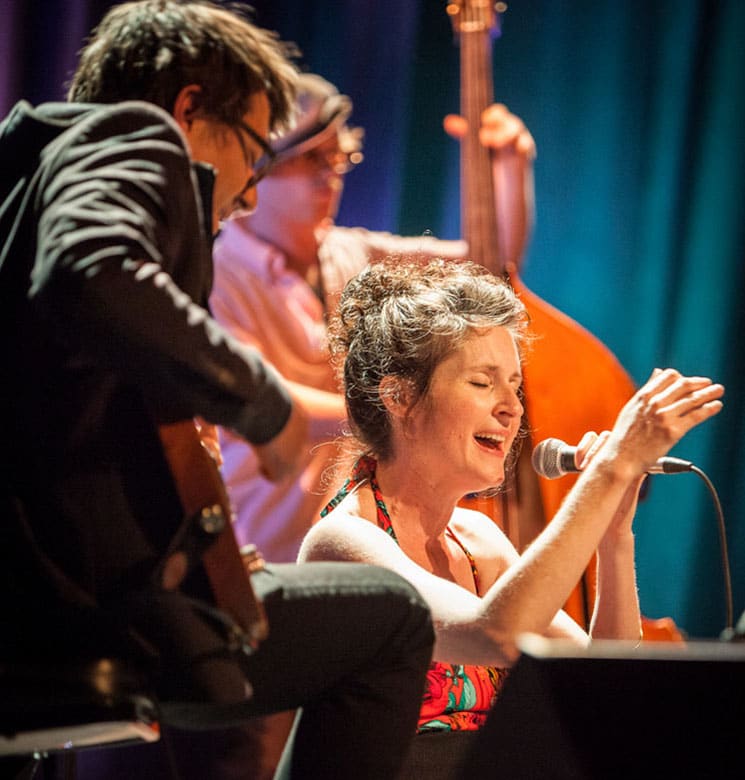Julia Ulehla and Aram Bajakian, the husband and wife centre of Dálava, sing and play their way through the cabaret seated crowd on their way to the stage, so that even before the show "officially" starts, the audience is involved. Drawing us even closer is Ulehla's opening explanation of the project's origins: a book written by her folklore-loving great-grandfather in Moravia, in the early 20th century Czech Republic. The man extended his understanding of botany into the songs of the region, believing them to be as alive as the native geography and fauna.
The music arising from the family experiment is simply gorgeous, mournful and joyous, and played with great care by the four mostly Vancouver-based musicians that round out the group: Peggy Lee on cello, Tyson Naylor on keyboards and accordion, Colin Cowan on bass and Dylan Van Der Schyff on drums. Hearing artists so skilled at jazz and improvisation turn their full power to the service of folk music is jaw-dropping at times.
The duo are the engine that drives the wayback machine, with Bajakian on electric and acoustic guitar, attacking the themes with ferocity, unleashing a sound that reminds us a little of Tom Waits-era Mark Ribot in its blend of drunken beauty enlivened with occasional atonal skronk. Meanwhile Ulehla charms with her song outlines, and her voice is a wonder; strong and passionate in the Moravian language, but laced with small imperfections that enhance its humanity and connection to the history she is bringing forward.
There are many noteworthy moments, including the song, "Vyletěla Holubička / The Bloody Wall," a song played early on about the death of a young man involved in a romantic triangle who is then transformed into a dove. Also, a piece that begins with a duet between Ulehla and Peggy Lee, whose cello was a perfectly expressive partner to her voice and a big reason the show left our hearts a few sizes bigger.
The music arising from the family experiment is simply gorgeous, mournful and joyous, and played with great care by the four mostly Vancouver-based musicians that round out the group: Peggy Lee on cello, Tyson Naylor on keyboards and accordion, Colin Cowan on bass and Dylan Van Der Schyff on drums. Hearing artists so skilled at jazz and improvisation turn their full power to the service of folk music is jaw-dropping at times.
The duo are the engine that drives the wayback machine, with Bajakian on electric and acoustic guitar, attacking the themes with ferocity, unleashing a sound that reminds us a little of Tom Waits-era Mark Ribot in its blend of drunken beauty enlivened with occasional atonal skronk. Meanwhile Ulehla charms with her song outlines, and her voice is a wonder; strong and passionate in the Moravian language, but laced with small imperfections that enhance its humanity and connection to the history she is bringing forward.
There are many noteworthy moments, including the song, "Vyletěla Holubička / The Bloody Wall," a song played early on about the death of a young man involved in a romantic triangle who is then transformed into a dove. Also, a piece that begins with a duet between Ulehla and Peggy Lee, whose cello was a perfectly expressive partner to her voice and a big reason the show left our hearts a few sizes bigger.
